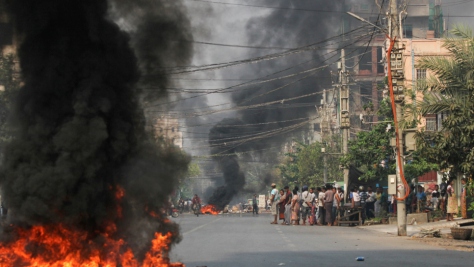Ethiopia: Somali refugees to be relocated away from border
This is a summary of what was said by UNHCR spokesperson Jennifer Pagonis – to whom quoted text may be attributed – at today's press briefing at the Palais des Nations in Geneva.
In Ethiopia today (Friday), UNHCR teams are expected to start relocating a group of 500 newly-recognized Somali refugees who fled from renewed conflict in strife-torn south and central Somalia over the last year. They have been staying around the Kebribeyah area, near the Somali border in eastern Ethiopia and are being relocated to a re-opened UNHCR camp at Teferi Ber.
The refugees are part of a group of 4,000 Somali refugees who have recently been granted refugee status by UNHCR and the government's Authority for Refugees and Returnees Affairs (ARRA). An estimated 7,000 additional Somalis who also claim to have fled fighting and insecurity in Somalia, are waiting to be screened at other sites in eastern Ethiopia.
The new camp site at Teferi Ber, some 120 km north of Kebribeyah, was formerly a UNHCR camp which in the 1990s hosted some 49,000 mainly Somalis refugees who had fled fighting in their country. The camp was officially closed in 2001 after all the refugees returned, mainly to the self -declared republic of Somaliland.
After arriving at Teferi Ber, the refugees will spend three days in a reception centre where they will be allocated plots of land to construct homes and given building materials. They will also be given food as well as tarpaulins, blankets, sleeping mats, kitchen sets, jerry cans, kerosene stoves, and soap. The ARRA has established a temporary health centre until permanent structures can be built.
The Somali Region of Ethiopia already hosts more than 16,500 refugees. With the new arrivals, the total is 20,300. At the peak of the Somali refugee crisis in the early 90s, the region hosted 628,000 refugees in eight camps. The overwhelming majority went home between 1997 and 2005, and all of the camps were closed except a camp at Kebribeyah.
Related news and stories
Thousands of newly arrived Somali refugees in Ethiopia relocated to new settlement
Samira's Story
Drought brings life-threatening food shortages for refugees in Ethiopia
100,000 new Somali refugees arrive in Ethiopia in the past month, UN and partners are calling for urgent funding
UNHCR teams and partners rush assistance to some 100,000 newly arrived Somali refugees in hard-to-reach area of Ethiopia
As the Horn of Africa drought enters a sixth failed rainy season, UNHCR calls for urgent assistance
-

Fresh start for Malian refugees in Burkina Faso as camp reopens
1 Apr 2021 The Goudoubo camp, empty after violence forced residents out, now bustles as schools and healthcare centres rebuild and businesses reopen. -

Hundreds of thousands displaced by violence in northern Mozambique
1 Apr 2021 -

Disability, Displacement and Climate Change
Apr 2021 Climate change may lead to a higher risk of forced displacement through an increased frequency and intensity of extreme weather events. People with disabilities face heightened protection risks and barriers to inclusion. -

News Comment: Six refugees among 137 killed in Niger's recent attack
1 Apr 2021 This news comment is attributable to Gillian Triggs, UNHCR's Assistant High Commissioner for Protection -

Evaluation of the Telling the Real Story Project 2.0
Apr 2021 Telling the Real Story 2.0 is a UNHCR project that focuses on Communicating with Communities (CwC), who are at risk of irregular movement. This evaluation seeks to provide accountability and learning, support UNHCR's fulfilment of its commitments to the donor and provide important lessons learned for UNHCR in replicating and/or scaling up its CwC initiatives in the context of the organization's regionalization/decentralization process. Attachments: ES/2021/02 Management response and Annexes (.zip) -

Youth with Refugees Art Contest
31 Mar 2021 -

Malian refugees are given a chance to start a new home
31 Mar 2021 -

Template for ball design.
31 Mar 2021 -

News comment: UNHCR calls on Myanmar's neighbours to protect people fleeing violence
31 Mar 2021 This news comment is attributable to Gillian Triggs, UNHCR's Assistant High Commissioner for Protection
